Seven Impossible Interviews Before Breakfast #72
(Summer Blog Blast Tour Edition): David Almond
 May 19th, 2008 by jules
May 19th, 2008 by jules
{Note: The rest of today’s Summer Blog Blast Tour interview schedule is posted at the bottom of this interview.}
If you haven’t read anything by British author David Almond, here—in the words of reviewers who covered his first novel, Skellig, winner of the Carnegie Medal and Whitbread Children’s Novel of the Year Award as well as a Printz Honor—are some of the themes you’re missing: “the transforming power of caring and love” (Publishers Weekly); “worlds enlarging and the hope of scattering death” (NY Times Book Review); “loneliness, friendship and grace” (ALA; Printz Award Selection Committee); “the fearful, wonderful fragility of life” (author Richard Peck); “essential goodness, faith, truth, and love” (author Karen Cushman); and “miraculous happenings” (The ALAN Review). In their review of Almond’s first novel, School Library Journal best summed up what I think is Almond’s greatest strength as a writer: “The beauty here is that there is no answer and readers will be left to wonder and debate, and make up their own minds.” In their review of Skellig, the New York Times Book Review praised my second favorite thing about Almond’s writing: his subtlety.
Skellig (Delacorte Press, 1999) tells the story of a young boy who, unhappy about his baby sister’s illness and the chaos of moving into a dilapidated old house, retreats to the garage and finds a mysterious stranger who is something like an owl, something like an angel, and even a bit like a man. Publishers Weekly called this book “a triumphant debut in the field of children’s literature with prose that is at once eerie, magical and poignant.” Almond followed Skellig with a series of books—Kit’s Wildnerness (Delacorte, 2000); Heaven Eyes (Delacorte, 2001); Counting Stars (Delacorte, 2002); The Fire-Eaters (Delacorte, 2004); a 2005 picture book, illustrated by Stephen Lambert — Kate, the Cat, and the Moon (Random House, 2005); Clay (Delacorte, 2006); and more—which were overwhelmingly met with critical acclaim, as well as a handful of more awards, including a 2001 Printz Award for Kit’s Wildnerness, a 2004 Boston Globe-Horn Book Award for The Fire-Eaters, and a Carnegie Medal shortlisting for Clay. It has been said that no one captures the mysticism of childhood like Almond; in fact, his books are often labelled “magical realism,” though part of the wonder of his writing is that it is, indeed, difficult to categorize. Certainly, themes of magic, memory, borderlands, creativity, darkness, death, religion, coming-of-age, the weaving of the mythic and the mundane, the nature of one’s self, and the vulnerability of children appear in his writings. When it comes to the topic of magic and his writing, perhaps Almond put it best when he said, “{w}riting can be difficult, but sometimes it really does feel like a kind of magic. I think that stories are living things — among the most important things in the world.”
Or, instead of trying to label Almond’s writing, we can leave it to The Guardian, who wrote, “David Almond’s books are strange, unsettling, wild things, unfettered by the normal constraints of children’s literature. They are, like all great writing, unclassifiable.”
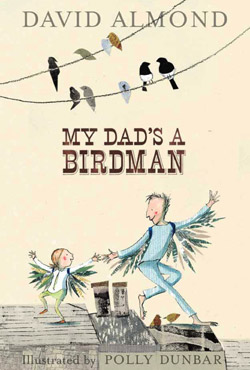 Almond’s been busy lately, which you’ll read about more in the interview below. Many of his novels have been adapted to the stage, including an upcoming opera adaptation of Skellig. And his latest book, My Dad’s a Birdman (Candlewick; April 2008; reviewed here at 7-Imp), shows a bit of a departure for him — it’s an illustrated novel, brought to vivid life by illustrator Polly Dunbar, about the power of love and imagination to overcome grief (to be sure, those themes aren’t a departure for Almond, but an illustrated novel is). With even more illustrated novels in the pipeline, as well as some exciting new projects (including a “part novel, part graphic novel” with Dave McKean), Almond shows no signs of slowing down any time soon. Lucky for us.
Almond’s been busy lately, which you’ll read about more in the interview below. Many of his novels have been adapted to the stage, including an upcoming opera adaptation of Skellig. And his latest book, My Dad’s a Birdman (Candlewick; April 2008; reviewed here at 7-Imp), shows a bit of a departure for him — it’s an illustrated novel, brought to vivid life by illustrator Polly Dunbar, about the power of love and imagination to overcome grief (to be sure, those themes aren’t a departure for Almond, but an illustrated novel is). With even more illustrated novels in the pipeline, as well as some exciting new projects (including a “part novel, part graphic novel” with Dave McKean), Almond shows no signs of slowing down any time soon. Lucky for us.
It truly is an honor for 7-Imp to be hosting a visit with Almond today. I’m a hugely huge fan, and I thank him for his time. Without further ado . . .
7-Imp: Can you talk a bit about what drew you to tell the story of Lizzie, her father, their wings, and the dumpling-throwing Auntie Doreen in My Dad’s a Birdman?
David: The story started as a play. It was commissioned by the Young Vic Theatre in London. They wanted a play for younger children, with some Skelligy themes, to run in the studio space while the stage version of Skellig was performed in the main theatre. I started doodling and scribbling and playing with possibilities and pretty soon Jackie Crow appeared with his home-made wings, and here was Mr. Poop and his Human Bird Competition, and Auntie Doreen with her dumplings, and the nice head teacher Mr. Mint. You can never quite tell where stories and characters come from. With this bunch, it was like they were ready-formed, waiting their chance to jump into the world. The play was great fun and the audiences loved it. Once the show was over, I moved on to other things, especially writing Clay, which took a lot of time and energy. After that, I looked at the play again. I thought maybe I could make a picture book from it. But that didn’t work. Then I thought, How about a short novel with illustrations…I wrote the first line, “An ordinary spring morning in 12 Lark Lane,” and the characters burst into life again. The first draft took me four days, which for me is astonishing.
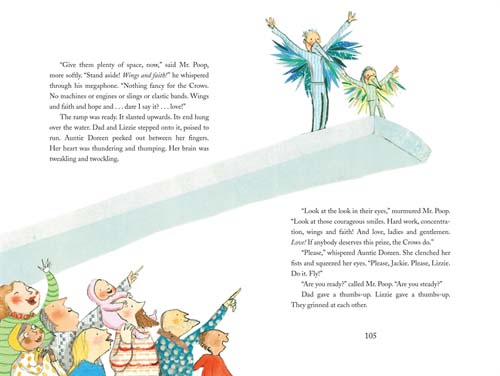
Illustrations copyright © 2007 Polly Dunbar. Reproduced by permission of the publisher, Candlewick Press, Inc., Cambridge, MA.
7-Imp: What was it like to see Polly Dunbar (whom we will be interviewing on Wednesday) bring your characters to life on the page with her illustrations for My Dad’s a Birdman?
David: I knew some of Polly’s previous work––especially the marvellous Shoe Baby––and I knew she could do something wonderful with this story and its characters. And she has. As soon as the first sketches started coming through, it was clear that the story had found a kindred spirit. Her work is fast, funny, light, poignant, joyous. Quite perfect. And I’m delighted that she’s illustrating another of my books––The Boy Who Climbed into The Moon––which comes out in the UK in 2009.
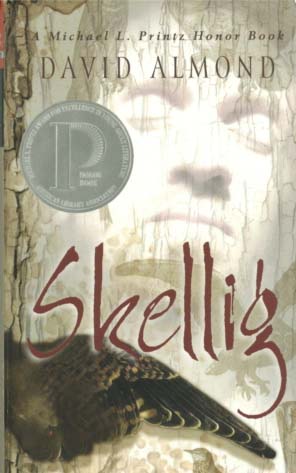 7-Imp: My Dad’s a Birdman marks the second time you’ve written, almost allegorically, about faith and wings (after Skellig). You also address religion in Clay, what School Library Journal called a “Catholic ghost story.” Reviewers like to describe your stories as metaphysical and surreal and have dubbed it––in the case of Skellig and Clay––“magical realism.” What draws you to writes such philosophical stories?
7-Imp: My Dad’s a Birdman marks the second time you’ve written, almost allegorically, about faith and wings (after Skellig). You also address religion in Clay, what School Library Journal called a “Catholic ghost story.” Reviewers like to describe your stories as metaphysical and surreal and have dubbed it––in the case of Skellig and Clay––“magical realism.” What draws you to writes such philosophical stories?
David: In many ways, you don’t choose what you write about. Your material comes and gets you and says, Write me! Yes, there’s lots about faith and wings, and exploration of metaphysical matters. I guess it comes from having a Catholic childhood. I struggled against the Catholicism for a long time, but there came a moment when I recognized that it would never go away, and when I also recognized that it was a kind of treasure house of language, imagery, ritual. So I just allowed it to influence my fiction. I was influenced by “magical realist” authors like Márquez, Borges, Calvino -– the way they deal with extraordinary events in ordinary language. Magical realism is of course mainly encountered in Catholic cultures. But there are many other forces. Right from the beginning of recorded culture, there have been stories and images about creatures like us who happen to have wings. And yes, Clay takes place in a Catholic setting, but it’s built around the Jewish legend of the Golem.
7-Imp: Your first novel, Skellig, won the Whitbread Children’s Award and the Carnegie Medal. How did those awards and all the critical acclaim impact your writing, if at all? Did you feel any outside pressure (or internal pressure) to top it with your next book?
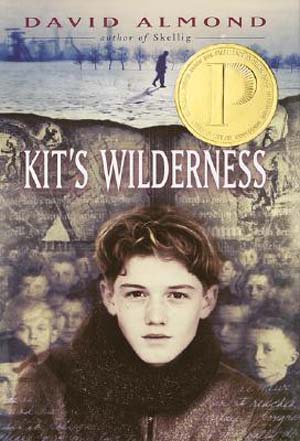 David: Before Skellig, I’d been writing for years without many people noticing. Then Skellig came along. In the months before it came out, there was a lot of fuss about it. Very exciting, but I knew the important thing was just to keep on writing, so as I waited for publication, I wrote Kit’s Wilderness. I finished it before Skellig was published. Skellig started taking off and winning prizes. People came along and said, So, what are you going to write next? It was great to be able to say I had another novel finished, and that I was already setting out on another––Heaven Eyes. Awards etc can bring pressure, but the best kind of pressure comes from yourself. You have to have high expectations. I want to keep moving forward, trying new things. I want every new book to be better than the one that preceded it.
David: Before Skellig, I’d been writing for years without many people noticing. Then Skellig came along. In the months before it came out, there was a lot of fuss about it. Very exciting, but I knew the important thing was just to keep on writing, so as I waited for publication, I wrote Kit’s Wilderness. I finished it before Skellig was published. Skellig started taking off and winning prizes. People came along and said, So, what are you going to write next? It was great to be able to say I had another novel finished, and that I was already setting out on another––Heaven Eyes. Awards etc can bring pressure, but the best kind of pressure comes from yourself. You have to have high expectations. I want to keep moving forward, trying new things. I want every new book to be better than the one that preceded it.
7-Imp: On that note, you hit it right out of the ballpark with your first novel. For readers who haven’t already seen this, can you summarize what advice—if any—you have for aspiring authors?
David: First of all, just do it. Don’t think about doing it or talk about doing it. Do it. Don’t think everything you write has to be good. It can’t be, so feel free to write rubbish. We all know that writing can be difficult, serious, burdensome, etc., but it is also a form of play. So enjoy yourself, and play: doodle and scribble, experiment with possibilities. Be brave enough to say that you actually like some of your work. Read and read. Aim high. Aim to be as good as your favourite authors. Don’t think that you have to know all of your story before you set off. Allow your story to grow organically. Writing is an adventure, a journey of exploration and discovery.
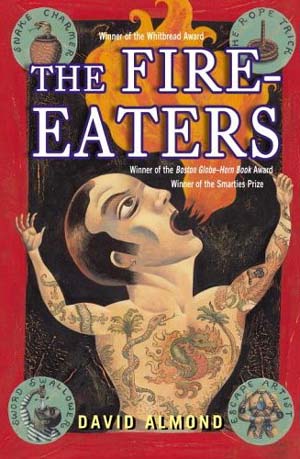 7-Imp: For Clay, you set the story in the English north country of your youth, just as you did with Kit’s Wilderness and The Fire-Eaters. Do you remember your childhood vividly and, if so, does it inform your writing?
7-Imp: For Clay, you set the story in the English north country of your youth, just as you did with Kit’s Wilderness and The Fire-Eaters. Do you remember your childhood vividly and, if so, does it inform your writing?
David: My work is filled with the language, landscape, history, etc. etc. of NorthEastern England. And it’s filled with influences from my own childhood. The first time I wrote about such things deliberately was in the story collection, Counting Stars, which I wrote just before Skellig (though it was published later). The stories are about a boy very like me and a family very like mine growing up in a town very like mine. Real and imaginary characters and real and imaginary places co-exist. In the stories, I learned how to deal with vivid memories—especially the deaths of my sister and my father––to make them work as fiction, and how to accept and to celebrate my personal history and my Northern Catholic heritage. Ever since those stories, I’ve used incidents and characters from my childhood. In The Fire-Eaters, for instance, I recall the events of The Cuban Missile Crisis when I was eleven. In Clay, I draw on particular memories of being an altar boy. The memories, of course, are re-imagined and fictionalized. Sometimes my memories of childhood seem very vague. As I write, though, I often discover things about my own childhood that I had “forgotten.” Imagination and memory are very closely connected. When I’m writing well, a totally imaginary event can feel strangely like a memory.
I seem to be moving into a new phase. The two Polly Dunbar-illustrated books—My Dad’s a Birdman and the forthcoming The Boy Who Climbed Into The Moon—don’t really draw on my childhood, the north, or Catholicism at all. They’re stepping into newer—and barmier—territory. And the new novel Jackdaw Summer, though it’s set in Northern England, is much less influenced by memory than the books that I’ve done before.
7-Imp: You write at your web site that “{t}here are lots of people around who say that children and young people aren’t interested in language and books these days. These people should be dragged into children’s events like {the Edinburgh Book Festival} and to see how wrong they are.” How does talking to young people about your books (via school visits, books festivals, etc.) affect your writing, if at all?
David: I’m not sure that it actually affects my work, but it does affect my sense of the audience. I’m a great optimist. I see young people all around the world who are fascinated by books, by stories, by language, and who ask serious and perceptive questions about my work. It encourages me in my belief that young people form a wonderful readership, and that the children’s book world offers writers all kinds of opportunities for exploration and experimentation. Children accept stories in all kinds of forms, often in forms that might be seen by adults as too difficult, too whacky, too strange. I love writing illustrated fiction, for instance. There are very few options for a writer to work in such a form in adult books.
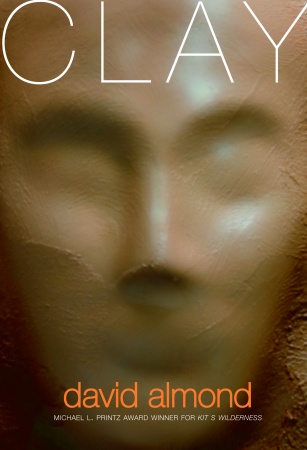 7-Imp: You also say at your web site that Clay was difficult—and sometimes scary—to write. Can you elaborate on that? Does it have anything to do with what The Guardian’s review of the novel noted, that “there’s no neatly tied-up ending and no redemption. The evil is still out there”?
7-Imp: You also say at your web site that Clay was difficult—and sometimes scary—to write. Can you elaborate on that? Does it have anything to do with what The Guardian’s review of the novel noted, that “there’s no neatly tied-up ending and no redemption. The evil is still out there”?
David: Yes, it does. Stephen Rose was a very troubling character. When he turned up at the start of the book I knew he was up to no good, but I thought that by the end of the story he’d be somehow drawn into the community and that there’d be signs of some inner goodness that would be exposed and in some way nourished. Well, it didn’t happen. He just kept on getting wickeder and wickeder! And at the end, he goes off into the darkness, presumably to work his wickedness elsewhere. So yes, the evil is still out there. This was interesting. As I wrote, it gradually became apparent that if the book was to work properly, things had to end up like that. And accepting this was difficult and pretty scary. Several reviews picked up on that, and one or two even concluded that the book was therefore nihilistic, and that I had succumbed to some kind of despair! Not true, of course. The next book I wrote was My Dad’s a Birdman, which is hardly a document of doom.
7-Imp: Erica Wagner of The Times wrote that your work, “like the best literature for children, is in fact simply literature.” This brings me to the question of audience, and I’m always interested in hearing authors talk about this: Do you write with a child or young adult audience specifically in mind, or do you write the story you’re led to tell with no particular reader in mind (or, as Maurice Sendak once said, “{t}here’s no way we can segregate what’s meant for the young from what’s meant for the rest of us.”)
David: I suppose I write for the reader in myself. I write everything with the utmost care and to the very best of my ability. I think that some of my “younger” work may be artistically better than the “older” work. A good children’s story should be accessible to everyone, not just the young. I’m a bit suspicious of the notion of “crossover” books that are supposed to appeal to adults because of their adult-ish themes. Stories don’t work through themes/issues, but primarily through their language and their narrative force.
With My Dad’s a Birdman, however, I did have my eight-year-old daughter in mind. I didn’t show it to her as it was developing, but I kept her in mind as the perfect reader. When it was finished, she read it, commented on it, and went through it with a pencil and pointed out some glitches.
I’m interested in developing the idea that books and bookish events can be for everyone. The stage adaptations of my work draw people of all ages. I do a lot of writing workshops, and more and more I have adults and children working together. And it’s marvelous to see how the adults are often astonished by the perceptiveness and creativity of the young -– and to see how children can teach the adults a lot about the joy and freedom of writing.
7-Imp: How many of your books at this point have been adapted to the stage, and did you write the scripts for all those? What is it like to see your words come to life on the stage in an entirely different medium?
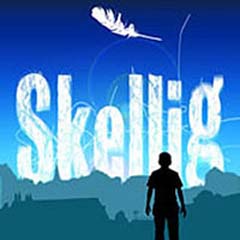 David: I adapted Skellig myself, and it was produced at The Young Vic, directed by Trevor Nunn. There will be a new production in 2008. Skellig is also to be an opera: music by the wonderful American composer, Tod Machover, libretto by me. It will be premiered in November ’08 at The Sage Gateshead (UK). I also adapted Heaven Eyes. It had two national tours with Pop-Up Theatre. Secret Heart was adapted by Amanda Dalton, and produced at The Royal Exchange in Manchester. Clay has been adapted for TV by Peter Tabern, and was recently broadcast by BBC. Clay is also being adapted for stage by the Yvonne Arnaud Youth Theatre and will be on at Edinburgh Festival Fringe in 2008.
David: I adapted Skellig myself, and it was produced at The Young Vic, directed by Trevor Nunn. There will be a new production in 2008. Skellig is also to be an opera: music by the wonderful American composer, Tod Machover, libretto by me. It will be premiered in November ’08 at The Sage Gateshead (UK). I also adapted Heaven Eyes. It had two national tours with Pop-Up Theatre. Secret Heart was adapted by Amanda Dalton, and produced at The Royal Exchange in Manchester. Clay has been adapted for TV by Peter Tabern, and was recently broadcast by BBC. Clay is also being adapted for stage by the Yvonne Arnaud Youth Theatre and will be on at Edinburgh Festival Fringe in 2008.
It’s wonderful to see my work recreated into different forms. They’re all forms of storytelling, of course. The supposed boundaries between different forms are in some way illusory. Fiction flows into drama into dance into song quite naturally — just as stories do when they are told to young children. Children automatically want to act out the stories they hear/read.
7-Imp: You write at your site that “{w}hen a book is published, it looks neat and organised, almost perfect, but that’s just the end result a playful, messy and far-from-perfect process.” Can you briefly tell us about your writing process (starting wherever you like: getting the idea, starting to write, under deadline, etc.), since a lot of our readers like to hear authors talk about that? Do you outline plot before you write or just let your muse lead you on and see where you end up?
David: I don’t do an outline before I start. I scribble, play, doodle, experiment, try out different possibilities. Once I set off, the story grows organically. I have an idea of where it’s going, but I also allow it to find its own shape. I think that writing is an act of discovery. If the story and its characters are any good, they will take on their own life. It may sound disorganized, but it is not. I write very carefully, painstakingly. I sound out my sentences, write and rewrite and rewrite so that the story I discover is given the very best possible shape.
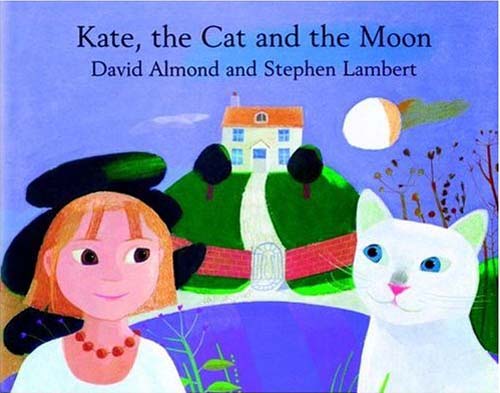
7-Imp: Do you think you have any more picture books in you?
David: Yes! The picture book is a wonderful—and fiendishly difficult—form.
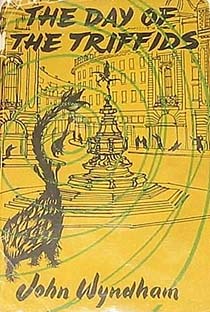 7-Imp: As a book lover speaking to other book lovers, what books and/or authors had an especially significant impact on you as an early reader?
7-Imp: As a book lover speaking to other book lovers, what books and/or authors had an especially significant impact on you as an early reader?
David: Roger Lancelyn Green wrote wonderful versions of old myths and legends -– esp the King Arthur stories. When I was a young teenager, I loved John Wyndham -– British science fiction writer whose best known work is The Day of the Triffids. I read a lot of stuff about the paranormal -– astral traveling, telepathy etc etc. There was a writer called Lobsang Rampa who wrote about his childhood in a monastery in Tibet (especially in a book called The Third Eye in which he detailed how his supernatural powers were awakened). He was “exposed” as a fraud -– he was a bloke from Essex, but I didn’t care. I remember reading Hemingway’s stories when I was in my mid-teens and feeling that I’d found a writer who really mattered to me.
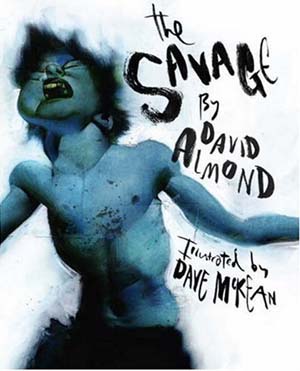 7-Imp: What’s next? Any new books/projects that you can tell us about? And can you tell us about your upcoming 2008 release, entitled The Savage, described as “{p}art novel, part graphic novel” and with art from Dave McKean?
7-Imp: What’s next? Any new books/projects that you can tell us about? And can you tell us about your upcoming 2008 release, entitled The Savage, described as “{p}art novel, part graphic novel” and with art from Dave McKean?
David: The Savage has just been published in the UK. It’s about a boy called Blue Baker. His dad’s just died. He lives with his mum and his sister Jess. His teachers are trying to help him through his sadness. The local bully, Hopper, is tormenting him. Blue begins to write a story called “The Savage.” It’s about a wild boy living in a cave beneath a ruined chapel at the edge of town. As Blue writes, the wild boy comes to life. He comes into town in the middle of the night and visits Hopper, then Blue’s sister Jess. Blue goes out to the edge of the town. He meets the savage beneath the chapel, and makes an astonishing discovery. I’d always envisaged it as an illustrated book. When I finished writing, I thought, Oh, the perfect collaborator would be Dave McKean. Fortunately, Dave loved the story, and his art work is just wonderful. The book comes out in the U.S. in the Fall (Candlewick Press).
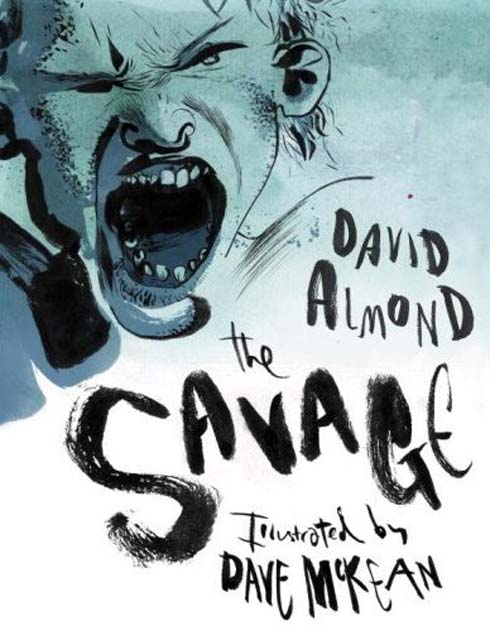
Another 2008 release is my new YA novel, Jackdaw Summer. It comes out in the UK in November. It’s set in present-day Northumberland, and it involves a foundling child, knives, snakes and a boy soldier from Liberia.
Also in November 2008, there’s the premiere of the opera of Skellig. Music by the US (Boston) composer, Tod Machover, libretto by me. We hope that the opera will appear in the USA.
Also: a new production of the Skellig play by Birmingham Stage Company. It will be staged in Birmingham and London in the fall 2008.
Also: a stage version of Clay at Edinburgh Festival Fringe 2008 (Yvonne Arnaud Youth Theatre).
A TV movie of Clay, starring Imelda Staunton as Crazy Mary, has just been broadcast by BBC. DVD is available from Amazon and BBC.
7-Imp: What’s one thing that most people don’t know about you?
David: I ran away from home when I was fourteen.
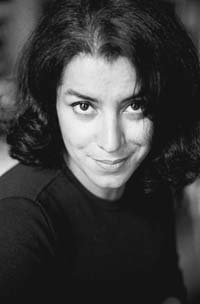 7-Imp: If you could have three (living) authors—whom you have not yet met—over for coffee or a glass of rich, red wine, whom would you choose?
7-Imp: If you could have three (living) authors—whom you have not yet met—over for coffee or a glass of rich, red wine, whom would you choose?
David: Seamus Heaney, Annie Proulx, Marjane Satrapi {pictured here}.
7-Imp: Is there something you wish interviewers would ask you -– but never do? Feel free to ask and respond here.
David: Q. How will Newcastle United ever win the English Premier League?
A. By recognizing my skills at last -– and selecting me as a dazzling midfielder.
7-Imp: What is your favorite word?
David: “Hawthorn.”
7-Imp: What is your least favorite word?
David: “Cornucopia.”
7-Imp: What turns you on creatively, spiritually or emotionally?
David: Beautiful cities (e.g. London, Tokyo, New York) on bright spring mornings.
7-Imp: What turns you off?
David: Cold, wet, northern November afternoons.
7-Imp: What is your favorite curse word? (optional)
David: “Ballocks!” or “Hadaway and shite!”
7-Imp: What sound or noise do you love?
David: The sound of skylarks singing.
7-Imp: What sound or noise do you hate?
David: Rain on a window.
7-Imp: What profession other than your own would you like to attempt?
David: Opera singer.
7-Imp: What profession would you not like to do?
David: Dentist.
7-Imp: If Heaven exists, what would you like to hear God say when you arrive at the Pearly Gates?
David: “Don’t worry. Up here is nearly as beautiful as the earth.”
about David Almond:
- David’s web site.
- Spotlight at Contemporary Writers; The British Council — Arts; 2008.
- “Flying Across the Tyne,” interview by Madelyn Travis of Booktrust Children’s Books; 2007.
- Short Random House feature at the release of Clay.
- Video of Almond talking about Clay at Meet the Author UK.
- Interview (Part One and Part Two) by Judith Ridge of Misrule; 2003.
- Sixty-second interview with Fiona MacDonald at Metro.co.uk;
March 26, 2002. - Interview by Joseph Pike at JubileeBooksCo.uk; March 2002.
- Interview with Linda Richards at January Magazine; February 2002.
- A Powells.com “original essay” by Almond at the release of Secret Heart.
- ACHUKA interview at the release of Kit’s Wilderness.
- “The man who came to stay,” interview with Claire Armitstead at Guardian Unlimited; July 15, 1999.
- Interview (audio) at Barnes and Noble Studio; Undated.
- Interview at BBC’s “Blast”; Undated.
Monday, May 19, 2008:

[…] David Almond at Seven Impossible Things Before Breakfast […]
Fantastic interview! This was a wonderful post to wake up to…
“…Very exciting, but I knew the important thing was just to keep on writing, so as I waited for publication, I wrote…”
My gosh, can I have that tattooed somewhere? This brilliant guy totally has NEVER had his head turned. Wow.
Great interview.
“Stories don’t work through themes/issues, but primarily through their language and their narrative force.” He couldn’t have described his own work better. Language is primarily what keeps me in a book. Not super-fancy, literary for its own sake language, but words that serve the story in unique ways.
Wow! This interview is my meal for the day. Thank you so much.
Thanks so much for this amazing interview. Almond is, hands down, my favorite writer. KIT’S WILDERNESS is, in my mind, the most technically perfect novel I’ve ever read and CLAY is astounding.
Once again, your interviewing prowess has completely blown me away. I loved the whole thing. And I really adored his advice for aspiring writers. Excellent, all ’round.
Very intelligent dialog, guys. Way to go!
Wow, this is an interesting interview–perfect timing, too, as I just got a copy of My Dad’s a Birdman to read….
[…] David Almond at Seven Impossible Things Before Breakfast […]
Wow. This is a great interview. And an opera on Skellig? I am so intrigued.
Oh my goodness. This interview was BRILLIANT. I enjoyed it so, so much. Thanks, guys!
Thanks for a great interview – not only was it an interesting conversation with an author I admire, it also reminded me that I have Kit’s Wilderness on my TBR pile!
[…] Seven Impossible Things Before Breakfast, children’s novelist David Almond talks about, among other things, The Savage, his […]
[…] David Almond (interviewed May 19, 2008): “I see young people all around the world who are fascinated by books, by stories, by […]
[…] David Almond (interviewed May 19, 2008): “I see young people all around the world who are fascinated by books, by stories, by […]
Good morning David wanted to ask if you can help me find my roots, I am Peruvian and my surname ALMOND grandfather was English and even where they lived in Newcastle and belonged to the Masonic lodge have some documents of my grandfather and great grandfather.
Excuse the trouble I know it’s not your problem but have not lost anything on this please ask if you can not help you guide me where can I find out my family.
Thank you before hand and hope that what I am asking you do not mind.
Greetings and God bless you and your family.
john almond
[…] fact, Almond stopped by here in 2008 for an interview, and here is the 2009 McKean interview, quite possibly my favorite 7-Imp […]
“Hawthorn.” Yes, that’s a beautiful choice!
On topic: thanks, an interesting interview.
Off topic: I am thinking that if you have not read it, you ought to read Leon Garfield’s “Smith.”
[…] Rex @ Fuse #8,David Almond @ Seven Impossible Things Before BreakfastDave Schwartz @ Shaken & StirredElizabeth Scott @ Bookshelves of DoomLaurie Halse Anderson […]